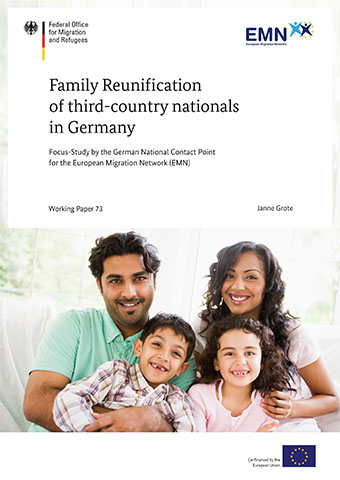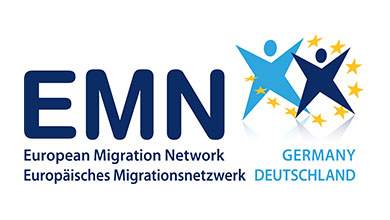Family Reunification of third-country nationals in Germany ,
 Source: BAMF
Source: BAMF
This study describes the legal framework, conditions and restrictions of the family reunification with the single family members, i.e. with spouses or civil partners, with minor children, parents or other family members. Furthermore, the application procedure, conditions which have to be complied with before entering the country as well as conditions and support measures which family members face after entering the country will be described.
Public and political debates about family reunification have intensified during the last few years, as, not least due to the war in Syria, the number of asylum applicants and residence titles granted for the purpose of protections has risen palpably. With beneficiaries of protection enjoying particular rights to family reunification the focus shifted to family members who might want to join beneficiaries of protection and were entitled to do so.
Conditions and restrictions of family reunification
In general, the conditions for family reunification depend on the residence status of the sponsor and the degree of kinship of the family members who want to join them.
Generally speaking, there are six central conditions for family reunification with third-country nationals: The sponsor must possess a residence title, must be able to provide sufficient living space, healthcare insurance and sufficient means of subsistence for him- or herself and the family members. In addition, certain groups of immigrants will need to provide proof of their German language skills before they are issued with a visa and/or successfully attend language and orientation courses in the framework of the integration course after their arrival in Germany. Spouses and civil partners usually must be at least 18 years of age.
Certain conditions for family reunification may or are to be waived for certain groups of immigrants. This applies, for example, to the requirement of secure subsistence in the case of resettlement refugees, recognised asylum seekers, recognised refugees and beneficiaries of subsidiary protection. Restrictions are in place for beneficiaries of subsidiary protection, though. Family reunification will be suspended until 16 March 2018 for all those who were granted a residence permit for subsidiary protection purposes after 17 March 2016. During the two-year suspension, admission for family reunification grounds will only be possible in cases of special hardship under international law provisions or for urgent humanitarian reasons
Family reunification will not be permitted in case of a forced marriage or civil partnership or a marriage or civil partnership of convenience. Family reunification will not be permitted either if the sponsor is non-enforceably or enforceably required to leave the country or belongs to a number of other status groups.
Scope
Since 2014, the number of residence titles granted to third-country nationals for the purpose of family reunification with Germans or third-country nationals has risen considerably. Between 2010 and 2013, the number of residence titles granted for the purpose of family reunification amounted to nearly 55,000 per year. In 2014, it rose to 63,677. And in 2015, it rose further, to 82,440. Most of these residence titles were issued to wives or female civil partners who joined their husbands or civil partners. Minor children are the second-largest group. In 2015, the ten most important countries of origin were Syria, Turkey, the Russian Federation, India, Kosovo, the US, Ukraine, China, Iraq and Bosnia and Herzegovina.
Challenges
The significant increase in the number of asylum applicants and beneficiaries of protection over the last few years has created considerable challenges for both the families and for the German diplomatic missions abroad, particularly in the neighbouring countries of Syria, where visa applications for Germany are processed. Even though numerous measures have been taken to accelerate the procedure, the staff capacities are not sufficient to process all applications quickly; in fact, waiting periods for filing an application temporarily amounted to more than one and a half years at certain diplomatic missions. Additional staff increases, infrastructural measures and accelerated procedures have been introduced to tackle the backlog; however, due to the significant increase in the number of beneficiaries of protection, the number of persons entitled to file an application and the number of actual applicants is rising as well. Though, the restrictions to family reunification of beneficiaries of subsidiary protection will delay the arrival of their family members considerably.
Working Paper 73 was authored as part of the European Migration Network (EMN).
The study has been revised after its first publication and is now available in its second edition.
The study was drawn up by: Janne Grote

